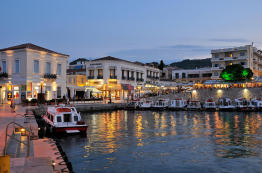19th Century
When the 1821 Revolution came, Spetses was the first of the Argo-Saronic islands to join the battle. The towns and villages of the Peloponnesus had already taken to arms, and the elders sent out a call for support to their island neighbours. The reply came back without delay, despite the fact that due to their affluence, the Spetsiots did not suffer great hardships under Turkish rule. On April 3rd the Chancellery was taken without opposition, and the ships' captains swore allegiance to the revolution. The forces of Hydra were also enlisted, after consultations between the captains of both islands.
The Spetsiot fleet comprised of around 55 merchant vessels which had been converted into well-armed men-of-war. With names taken from Greek mythology, the magnificent armada liberated fortresses, blockaded ports and transported supplies. Their courageous crews also took part in the besieging and conquering of towns, which greatly speeded the arrival of freedom to the area.
The best-known of these brave warriors is also the only female admiral in Greek history, Laskarina Bouboulina. She was born in 1771 in a Constantinople prison to the Hydraean captain Stavros Pinotsis, who was at the time incarcerated there as punishment for his participation in the Orloff uprising, and would later die there. Her mother went on to marry the Spetsiot captain, Vassileos Lazarou or Orloff, and the family took up permanent residence in Spetses. At the age of 17, Laskarina married captain Dimitrios Giannouzas, who was killed in a naval battle with Algerian pirates. Her second husband, Dimitrios Bouboulis was lost to her in the same way, and at the age of 30, Bouboulina found herself twice widowed with seven children of her own and four step-children from Bouboulis' first marriage to take care of.
Fortunately, financial worries were never a factor for Laskarina Bouboulina. She was heir to a vast fortune which she augmented by buying shares in a number of local ships and building three of her own, including the renowned "Agamemnon", which played a vital role in the revolution. Already a member of the "Friendly Society" (the organisation founded to cover the activities which would lead to the revolution), when the fighting began, she created and sustained her own unit of men, as well as crews for her battle-ships. She brought in weapons and supplies from abroad, which she concealed in secret hiding-places. All of this contributed to the diminishing of her once-great fortune, but enabled many important naval battles to take place. Her own personal sacrifices for the revolution were not limited to the financial burden, or even to her placing herself at the forefront of danger, as a much-respected Admiral of the fledgling Greek Navy. She also lost two of her beloved sons to the struggle for freedom from the Turks. After the Revolution had freed this part of Greece, Bouboulina lived in Nafplion with her daughter, until civil war erupted and claimed the lives of her son-in-law and his father. She then returned, embittered and close to poverty to her first husband's mansion in Kounoupitsa. It was here that this celebrated lady was to meet her inglorious end, murdered by a member of the Koutsis family in May 1825, when her son, Georgios eloped with their daughter.



